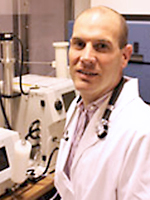
Sophisticated research methods show DNA altered by diesel fumes.
Despite air pollution levels being lower than they used to be in places such as Canada and the U.S., air quality remains a persistent problem requiring increasingly sophisticated research tools to understand how deeply it affects human health, according to Vancouver Coastal Health Research Institute scientist and respirologist, Dr. Chris Carlsten.

“Usually when we look at the effects of air pollution, we measure things that are clinically obvious – air flow, blood pressure, heart rhythm,” says Dr. Carlsten, associate professor in the division of respiratory medicine at the University of British Columbia (UBC) and director of the Occupational Lung Disease Clinic at The Lung Centre at Vancouver General Hospital. “But we need to understand what’s happening in terms of the plausibility behind ongoing associations between air pollution and health effects that epidemiology can document at modest levels of air pollution.”
One key objective of Dr. Carlsten and his team’s research is to add scientific knowledge that increases the plausibility of the air pollution health effects being seen.
Epigenetics, which includes studying the chemical reactions that activate and deactivate parts of genes due to factors added to an individual’s DNA, offers a mechanism that can develop such scientific knowledge.
Using an epigenetics framework, Dr. Carlsten and his colleagues recently published a study in Particle and Fibre Toxicology showing that as little as two hours of exposure to diesel fumes can alter the epigenetic marks on DNA. Led by UBC graduate student Ruiwei Jiang and co-authored by Dr. Carlsten and Dr. Michael Kobor, the study found that the naturally occurring chemical process of methylation, which normally involves carbon-hydrogen methyl groups turning some genes off or genes on, is influenced by exposure to diesel fumes. They saw that at some DNA locations, exposure to diesel fumes either added methyl groups or reduced how many were present, which implies genes being switched on or off, the cumulative effects of which may lead to detrimental health effects.

“Cleaning the air is our primary goal and our efforts should go into that, but the field of epigenetics gives us hope, from a public health perspective, that it can actually lead to some reversal potentially of the changes we’re observing,” Dr. Carlsten says.
Basing air pollution policy on science requires better communication
“The platform, statistical analysis, and study design we employed allowed us to see a measurable signal – a change on a level that can only be detected through very high resolution design,” explains Dr. Carlsten. “We wouldn’t have been able to see this before, which is important because it represents technological progress.”
Such scientific progress is crucial for informing air pollution policy, he adds.
“Historically, in general, science has been extremely influential in shaping regulations, as it should be,” says Dr. Carlsten. “A goal of my lab is to be better science communicators because that is where we’re ultimately going to have influence.”
“In the developing world, we need to use both new and existing knowledge to pressure regulatory authorities to work with their complex structures to try and decrease air pollution,” adds Dr. Carlsten.
“I see air pollution as something that we hope – and as a community we’re working – to decrease, but in the foreseeable future it’s ongoing.”
Dr. Chris Carlsten is a featured speaker at the upcoming Celebrate Research public lecture: Breathe Into Research, hosted by the Vancouver Coastal Health Research Institute. Researchers will be sharing health resources and research findings that empower people living with lung diseases. RSVP for this evening talk on lung health and join us on March 4, 2015, at Vancouver General Hospital.


